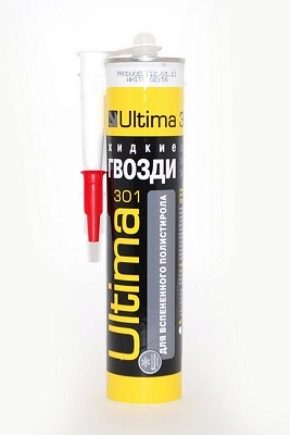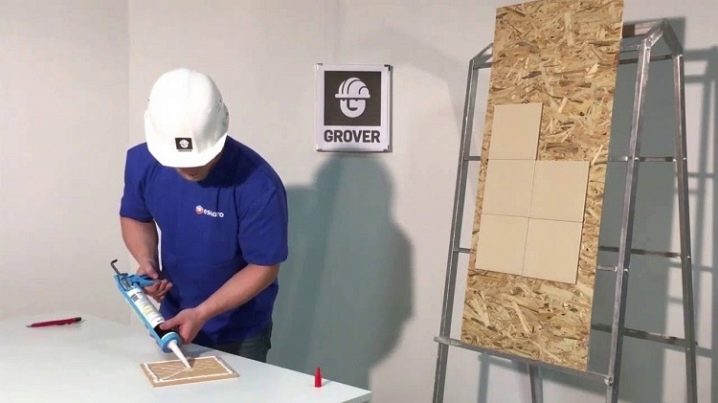Liquid nails for ceramic tiles: pros and cons

When working with ceramic tiles, use liquid nails. This material has a number of features, pluses and minuses: we sort it out together.

What is it?
Liquid nails are a modern adhesive that is used to join parts in construction. The strength of the connection is equivalent to fastening the parts with nails. This glue is packaged in easy-to-use packages in the form of tubes of various designs, which are securely closed during inactivity. Otherwise, the adhesive may deteriorate. It provides reliable adhesion to most materials and surfaces, including ceramic tiles and gypsum substrates.
The drying and curing time of the glue is much shorter, but it is enough to correct mistakes in installation.



Views
Modern liquid nails come in two main forms:
- water-based acrylic;
- neoprene organic solvents.
In terms of bond strength, these varieties are approximately equivalentalthough there may be differences in quality and usability. Acrylic-based liquid nails are diluted with water, which reduces the possibility of harmful effects on the body. They can be used in rooms where there is no high humidity, and temperature drops are small. Otherwise, the adhesive base loses its properties.
If these conditions are met, when working with porous materials and plastics, the connection is strong and durable.


The adhesive composition of liquid nails based on organic solvents is heat-resistant. It is resistant to high humidity, reliably resists the action of fungus. The setting period is short, there is almost no time left to correct errors, so preparation for laying must be thorough. The strength of the glue is high, but environmentally liquid neoprene-based nails are more dangerous than acrylic analogs. During work and for several days after its completion, it is necessary to avoid being in the room: harmful fumes are not excluded. Both acrylic and neoprene glue are superior in strength to PVC glue.


How to choose?
The experience of the craftsmen shows that it is safer to use water-soluble compounds Titan WB 50 or "Solvent Free" as liquid nails for tiling the surface with tiles. For the bathroom, it is better to use another glue that is more resistant to such conditions, for example, "Nail Power" or "Teb Surround". If you need to lay massive, dimensional tiles, use Zigger 99, LN 901, Hevy Djuti. Excellent adhesion to brick, drywall, concrete with Titebond Multi Purpos liquid nails.



When working with ceramic tiles and liquid nails, it is necessary to carry out the preparatory work especially carefully. The final result depends on this. This adhesive is quite strong, but a dusty, unprepared surface can cause poor adhesion.
The choice of glue matters: you need to choose it taking into account the weight of the material, its thickness, and the type of surface. It is important to consider the type of plane (vertical, horizontal), the time for preliminary and final hardening. Before buying a total volume, you need to consult with masters or sellers on the choice of one or another glue, carefully study the instructions for several types of material.
Having decided on the brand of glue, the estimated volume needs to be increased by 10-15%. This will avoid running out of liquid nails when working with tiles.


You can buy trial samples and test them for suitability for the intended job.
Consider the following:
- Check the glue setting time.The instructions contain recommendations for correct use, including the time.
- Particles of chalk and calcium carbonate, which reduce adhesion, must be avoided.
- In the presence of acetone and toluene, the glue is not suitable for work, its smell and harmful effects can last for a long time.

- Some brands of water-soluble liquid nails ("Solvent Free" or "Titanium WB-50") can be used when gluing ceramic tiles in rooms with high humidity.
- The mirror amalgam will not deteriorate if you use Moment Montage, LN-930 or Zigger 93 liquid nails when fixing it.
- When decorating a bathroom, you can use Tub Surround or Nail Power liquid nails.



It is important to take into account one nuance: it takes about 12 to 24 hours for all varieties to fully polymerize (harden).
Stages of work
Before covering with glue, the tile surface must be cleaned, dried and degreased. Liquid nails are applied over the area with a thin snake, if the tiles are light, dotting is enough. The tile must be pressed firmly against the prepared surface for a few seconds: this will determine the degree of strength. Liquid nails dry on the glued tile for 24 hours, finally dry after a week. It is not worth touching and moving the tiles during this period, so as not to spoil the strength of the fixation. After 5-7 days start grouting. It is not recommended to lay tiles on the floor of the bathtub using liquid nails: for such purposes, a special waterproof glue is used.


Excess glue
To minimize the amount of excess glue when gluing ceramic tiles, you need to accurately determine the amount of glue for each tile. Experienced craftsmen know how to do this, it is better to entrust them with such work in order to be sure of getting quick and high-quality results. However, in the process, the advantages of liquid nails can turn into disadvantages. For example, it is not always possible to remove dried glue: it becomes stronger every hour.

Therefore, it is advised to remove excess glue immediately during work, using a clean, soft cloth.
If the moment is missed, you will have to use more complex techniques to remove dried glue residues:
- A special cleaner that can be purchased at any building materials store. It is applied to areas with dried glue, kept for 15-20 minutes, then washed off and wiped with a clean soft cloth.
- You can use a scraper or brush-type attachments on a screwdriver. Here, too, some experience is needed so as not to damage the surface of the tiles.
- Remove small glue residues with a cleaner. However, if the glue has taken on tightly, this method is ineffective.
- You can heat the tile surface in any safe way up to 60 degrees. When the glue is at this temperature, it softens and is removed with a spatula.

pros
Liquid nails have many advantages.
- They are waterproof: polymer compounds are highly water resistant. The ingress of moisture into the seam does not affect the strength properties of the joint.
- The adhesive is distinguished by high strength: after hardening, the composition becomes stronger than concrete and retains its properties for a long time.
- In terms of voltage, products of leading brands can withstand up to 80 kg / sq. see Liquid nails can fix ceramic tiles of considerable weight.
- They are characterized by resistance to rust, mold, fungus, rotting in conditions of high humidity.

- They are characterized by automation: a construction gun can be used to apply the glue, thus increasing safety and production culture.
- This material is convenient: the composition is ready for use, there is no need to prepare a mixture.
- There is a small time interval for error correction.
- Adhesives of liquid nails are universal when gluing many homogeneous and dissimilar surfaces, which is especially important when gluing tiles under a stone.
- The adhesion of this glue is high enough for most building and finishing materials.


Minuses
- Not all liquid nails are moisture resistant. High humidity worsens the main properties of certain brands of liquid nails.
- Ceramic tiles are not recommended to be laid on the floor using liquid nails, it is better to use special tile glue. It will be safer and cheaper this way.
- Varieties of glue on a neoprene base can adversely affect the human body, therefore, a rather long period is needed until the neoprene fumes completely disappear.

- Removing excess cured adhesive requires additional materials and time.
- It is almost impossible to fix poor-quality styling after the liquid nails begin to harden.
- Working with liquid nails and ceramic tiles should be carried out under stable temperature conditions.
- When overheated in a can, the glue loses its consistency and may become unusable.

The time during which the correction is possible is no more than minutes. This is enough for an experienced craftsman, but for a beginner it can be a real problem. All manufacturers produce liquid nails in cans of 300-500 grams, this is unprofitable for a significant amount of work.
If tiles are laid over a large area, the cost of purchasing glue may exceed the cost of the cladding itself.

The choice of adhesives such as liquid nails is now wide, a careful approach will avoid mistakes and get a reliable result. Before starting work, you should try to find out more information about the quality of the glue and the possibilities of its use in specific conditions. A lot of information is contained in the instructions for use indicated on the product packaging. In general, liquid nails are a glue with a good functional effect. The composition does not need to be specially prepared, with the help of a construction gun, the composition is easily applied to the surface of the tile, sets in a short time and reliably holds glued parts of light weight.


When buying, you should pay attention to the expiration date: after its expiration, the glue loses its properties, which may affect the quality of adhesion of the tile to the base of the surface.
You can find out more information on this issue in the video below.













The comment was sent successfully.